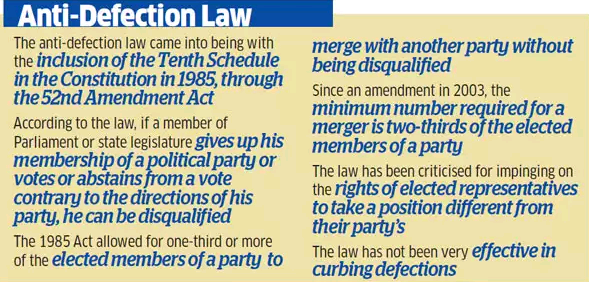Anti Defection Law and the 10th Schedule of Constitution 25/09/2019 – Posted in: Daily News
Anti Defection Law
For: Preliminary & Mains
Topics covered: About Anti-Defecation Law
News Flash
Five India National Lok Dal (INLD) MLAs disqualified from Haryana Assembly.
Anti-defection law
Anti defection law was introduced by the 52nd constitutional amendment act 1985 to prevent the defections from one political party to another in lieu of certain gains by members of parliament and state legislatures, it led to introduction of 10th Schedule.
It lays down the process by which legislators may be disqualified on grounds of defection by the Presiding Officer of a legislature based on a petition by any other member of the House.
Disqualification
- A member of the house (parliament or a state legislature) becomes disqualified for being the member of the house in case of the following:
(a) If he gives up the membership of political party voluntarily.
(b) If he votes or abstains from voting contrary to the directions issued by his political party without obtaining the prior permission of the party and such an act has not been condoned by the party within 15 days.
- Independent members become disqualified for being the member of the house in case he joins a political party after being elected to the house.
- Nominated members become disqualified if he joins a political party after the expiry of six months from the date on which he takes the seat in the house.
Expectations under the law
- If a member leaves the party as a result of the merger of party with another party the rule of defection does not apply.
- If a member leaves his party temporarily on account of being elected as the presiding officer of the house to maintain the dignity of the position, he is not considered as a defecting member.
Advantages/ Benefits
- The basic tenet behind this act is to strengthen democracy by preventing political defections motivated by mischief and lure of material and political benefits.
- It provides stability to the government by preventing shifts of party allegiance.
- It promotes stability in body politic by preventing the tendency of legislators to change parties according to perceived benefits.
- It also gives clear cut recognition to the political parties.
- It also facilitates mergers.
- It checks corruption in the political sphere by keeping a check on non-developmental expenditure.
91st Amendment Act of 2003
- The total number of ministers including the Prime minister in the central council of ministers shall not exceed 15% of the total strength of the Lok sabha/State legislative assembly.
- A member disqualified under defection is also disqualified for being a minister in house.
- The member disqualified on the grounds of defection shall also be disqualified for any remunerative political post, office wholly or partially under the government .
Source: The Hindu
READ MORE DAILY NEWS
- Gaganyaan Mission
- Controlled Human Infection Model
- International Migrant Stock 2019
- Changes in Corporate tax and Income tax rules
You are on the Best Online IAS preparation platform. You are learning under experts.
We are present on Facebook- Diligent IAS, LinkedIn- Diligent IAS, YouTube- Diligent IAS, Instagram- Diligent IAS. Get in touch with us.

